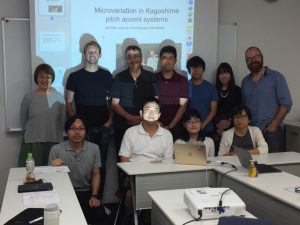Entering MA student Anissa Zaitsu spent the tenth week of the quarter as a participant in the MICHHERS program at the University of Michigan in Ann Arbor. She sent in this report about her time there:
“My time in Michigan has been intellectually enriching. I am one of a group of 24 students across 6 different disciplines in the humanities, one of just 4 linguistics students and the only student from UC Santa Cruz. I am working with Acrisio Pires, on my Why-VP research, and have been getting a lot of new feedback and guidance on the topic. Most importantly, I have to present this research to the entire cohort, most of whom are not linguists, so I have had to learn how to present technical linguistic work to people outside of our discipline in such a way that its importance and relevance is clear–a useful and difficult skill to acquire. Each day there is an interdisciplinary workshop and then a discipline-specific event. I have been involved in two linguistics seminars, one with Marlyse Baptista who does morphosyntax work on Creoles and more generally on language contact, and another with Sam Epstein on what it means to work in the generative tradition.
It has been amazing talking to young researchers like myself who do fascinating research across a number of disciplines, looking for ways to make connections between my theoretical work and theirs. This has been a real challenge but the experience has helped me dig deeper and gain perspective about what my own research is about and why it matters.
In addition, the program also has a strong diversity component, and so many of the students come from backgrounds which are underrepresented in graduate programs; the issues that this raises have been a big part of the discussion here.
Above all though, I am enjoying the sights and scenes in Ann Arbor. The weather has been beautiful and the streets are filled with lush greens. I am told it is not this way all year…”
